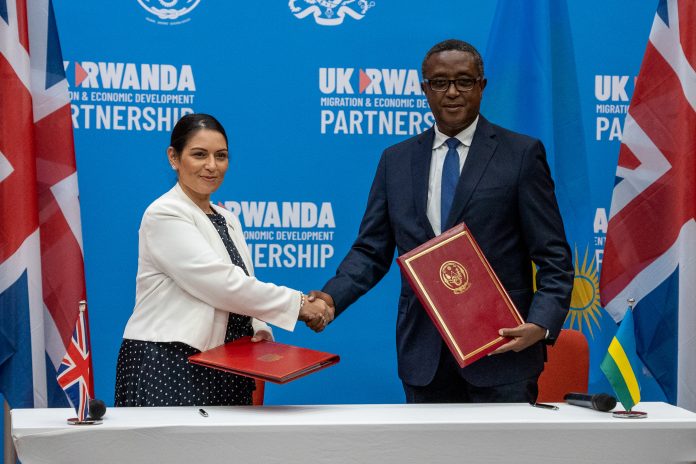
By Em. Prof. Dr. Marc Bossuyt (University of Antwerp), the former President of the Belgian Constitutional Court and former Belgian Commissioner General for Refugees. In 2023, he published the book “Right of asylum: between demagoguery and hypocrisy“. As Belgium’s leading asylum expert, he has taken a critical stance towards the jurisprudence of the European Court of Human Rights in asylum cases for years.
Three years ago, when it announced its new Pact on Migration and Asylum, the European Commission recognized that “the current asylum system no longer works”. As a result, other, and better systems should be explored. One of the options is to allow asylum claims to be processed outside the EU. Experience has shown that once an asylum seeker has been able to enter the EU, his repatriation is extremely difficult.
First, it was first claimed that no third countries were prepared to do so. However, when it turned out that Rwanda was, the argument became that it was … not the good country. It is said that Rwanda does not fully respect human rights. As if that were the case in most other African countries. It is true that Rwanda is tough towards those who are nostalgic for the previous regime that was responsible for the genocide of the Tutsi. However, those are not the asylum seekers that the United Kingdom intends to send to that country. These are asylum seekers that have no reason to fear persecution in Rwanda.
UK inks new Rwanda asylum treaty, describes it as model for EU states https://t.co/b8qTS7pd86
— Euractiv (@Euractiv) December 6, 2023
EU asylum law does currently not allow for Rwanda-style deals
Today’s EU asylum directives do not allow for such an agreement, except in the case of Denmark, which benefits from an opt-out clause. Then since the United Kingdom is no longer an EU-member, it is no longer bound by those directives.
What is important is that no treaty gives asylum seekers the right to apply for asylum, let alone to receive it, in the country of their choice. The Geneva Convention on the Status of Refugees only grants the right of an asylum seeker not to be returned to the country where he or she fears persecution. In the European Convention on Human Rights, there is not even a provision on asylum.
So far, the agreement between Rwanda and the United Kingdom, concluded in April 2022, has not yet been implemented. Once again, the European Court of Human Rights has, by means of an interim measure, prevented a State party to the European Convention on Human Rights to carry out its asylum policy.
The European Court thereby obliged the United Kingdom to give asylum seekers the opportunity to take the long road of exhaustion of national remedies. Presumably in the hope that ultimately the British Supreme Court would find some objection to that agreement. This happened on 15 November 2023. Clearly influenced by the Strasbourg Court, the British Court ruled against the implementation of that agreement. It does not consider Rwanda as a safe country for asylum seekers.
New Rwanda asylum treaty deals with Supreme Court concerns, says James Cleverly https://t.co/J3BGe0wEAR
— BBC News (World) (@BBCWorld) December 5, 2023
Are asylum seekers more at risk in Rwanda than in Brussels?
No one claims that Rwanda is a perfect democracy, but it is a rare African country that manages to consolidate economic and social progress through good governance. Anyone who believes that there is a risk that asylum seekers sent to Rwanda will be accommodated in inhumane conditions, like in Brussels, where single males cannot anymore be accommodated, underestimates the importance that President Kagame attaches to keep order and neatness. In Rwanda, it is also unthinkable that, as in Belgium, local mayors would impede the creation of centers for asylum seekers.
It is by a narrow majority (51.89 per cent) that the British chose for Brexit in 2016. The fact that the EU was unable to prevent asylum chaos during the year preceding the referendum undoubtedly contributed to this. Meanwhile, the British have discovered that Brexit has not yet enabled them to better control illegal migration. However, the UK government remains determined not to allow things to get any further out of control. The agreement with Rwanda is an attempt to do so, as the UK is no longer bound by EU directives preventing a Rwanda-style deal.
Germany’s ruling SPD open to screening asylum applications in Africa https://t.co/cVB19V7G1d
— Euractiv (@Euractiv) November 6, 2023
Incentives and double standards
The aim of the UK-Rwanda agreement is not to transfer thousands of asylum seekers from the United Kingdom to Rwanda every year. It is hoped that, by demonstrating that an illegal crossing to the United Kingdom leads to a transfer to Rwanda, the number of such dangerous crossings would reduce drastically.
There is no guarantee that this will work. However, let a non-EU Member State try it. If it succeeds, it may also become possible to conclude such agreements with other countries. At least lives would be saved in the North Sea. It is a pity that the British Supreme Court missed the chance of putting an end to those drownings. Similar agreements could lead to the same result in the Mediterranean.
If continental Europe considers the transfer of asylum seekers from the UK to Rwanda inhumane, the EU should let them return back from the UK to the continent. They left from there (mainly from France or Belgium). The British are asking this, just like the EU is asking Turkey and Tunisia to take back asylum seekers that have come from there. Why not apply the same logic for asylum seekers that have left for the United Kingdom from the EU?
"Barnier pledges to tackle uncontrolled migration, but unless Australia’s approach is considered, not much will change"
New article, by @pietercleppehttps://t.co/R4GS2ckJ8M#migration #EU #OperationSovereignBorders #Barnier @michelbarnier #humansmuggling— BrusselsReport.EU (@brussels_report) May 11, 2021
Disclaimer: www.BrusselsReport.eu will under no circumstance be held legally responsible or liable for the content of any article appearing on the website, as only the author of an article is legally responsible for that, also in accordance with the terms of use.











